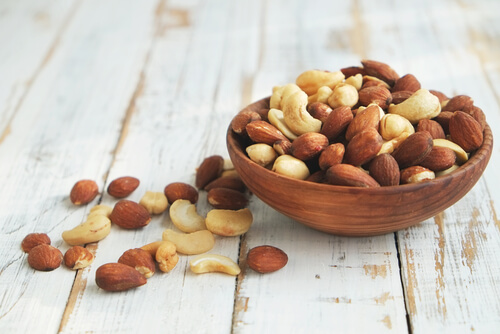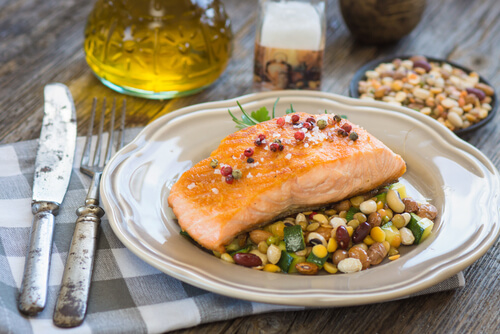10 Foods You Should Never Give a Baby

According to pediatricians, there are some foods you should never give a baby.
Some of them could have a negative effect on your child and their delicate digestive system, while others may pose a danger of asphyxiation.
Meanwhile, other foods are best avoided until your child is older, as they increase the risk of food allergies.
Whether you breast or bottle feed, sooner or later you’ll need to incorporate different foods into your baby’s diet.
As a parent, it’s important to be aware of the foods you should never give a baby.
10 foods you should never give a baby
1. Honey
Children under 1 year of age should never consume honey. It can contain a harmful bacteria known as clostridium botulinum, which can cause botulism, leading to muscle paralysis and other serious symptoms.
Your child’s immune system isn’t strong enough yet to be able to fight these dangerous bacteria.
2. Nuts
Don’t give whole nuts, including peanuts, to children aged 5 and under. These can be a choking hazard.
As long as there’s no family history of nut allergies, you can give your child peanuts in the form of peanut butter as soon as they’re 6 months old.

3. Strawberries
Strawberries are quite acidic, which makes them unsuitable for your baby’s delicate digestive system.
Stay away from strawberries until your child is a year old. Also make sure you’re aware of any history of allergies in the family.
4. Chocolate
Chocolate is one of the foods you should never give a baby. It contains caffeine, which is harmful to little ones.
Chocolate is also high in sugar, which should be kept to a minimum, for babies in particular.
5. Fruit juice
Fruit juice contains calories, but none of the fat, protein, calcium, vitamin D or fiber that babies need.
Too much fruit juice can lead to caries, diarrhea and other ongoing stomach problems.
6. Smoked and processed meats
Most smoked or cured meat (such as ham and bacon) contains nitrates and other damaging chemicals.
They’re also high in sodium and animal fat, which can be harmful to little ones.
7. Cow’s milk
Don’t give your child cow’s milk until they’re a year old. Cow’s milk doesn’t have all the nutrients (such as iron and vitamin E) that your baby needs to grow and develop in their first year of life.
This is why, for babies, breast milk is best.
Once your child is a year old, they can consume full-fat milk in moderation. Keep an eye out for a possible dairy or lactose intolerance.
8. Fish with high mercury content
Fish is a very healthy food. It’s rich in protein, vitamins and minerals. It also tends to be lighter than meat and easier for babies to digest.
However, look into the type of fish that you’re giving your baby. Some fish species tend to accumulate mercury in their bodies.
Take into account that mercury is a harmful neurotoxin, and can easily build up in your baby’s body.

9. Sugar and salt
Sugar and sugary food is harmful to young children. This is another type of food that you should never give a baby.
Too much sugar at an early age can alter your child’s dietary preferences, in addition to keeping them awake all night.
Too much salt is also harmful. Excess salt isn’t good for the kidneys, and should be avoided completely under a year of age.
From this time on, you can add salt to their food, but always in small amounts.
10. Rice-based cereal
If you give your child rice-based cereal or snacks, look for options that are made from brown rice instead of white.
These are far more nutritious, and will get your child used to the flavor of whole grains.
With this in mind, try wholegrain rice, oatmeal (with peanut butter or fresh fruit) or quinoa.
Whenever you introduce new foods into your baby’s diet, always be careful that they won’t lead to any harmful effects.
According to pediatricians, there are some foods you should never give a baby.
Some of them could have a negative effect on your child and their delicate digestive system, while others may pose a danger of asphyxiation.
Meanwhile, other foods are best avoided until your child is older, as they increase the risk of food allergies.
Whether you breast or bottle feed, sooner or later you’ll need to incorporate different foods into your baby’s diet.
As a parent, it’s important to be aware of the foods you should never give a baby.
10 foods you should never give a baby
1. Honey
Children under 1 year of age should never consume honey. It can contain a harmful bacteria known as clostridium botulinum, which can cause botulism, leading to muscle paralysis and other serious symptoms.
Your child’s immune system isn’t strong enough yet to be able to fight these dangerous bacteria.
2. Nuts
Don’t give whole nuts, including peanuts, to children aged 5 and under. These can be a choking hazard.
As long as there’s no family history of nut allergies, you can give your child peanuts in the form of peanut butter as soon as they’re 6 months old.

3. Strawberries
Strawberries are quite acidic, which makes them unsuitable for your baby’s delicate digestive system.
Stay away from strawberries until your child is a year old. Also make sure you’re aware of any history of allergies in the family.
4. Chocolate
Chocolate is one of the foods you should never give a baby. It contains caffeine, which is harmful to little ones.
Chocolate is also high in sugar, which should be kept to a minimum, for babies in particular.
5. Fruit juice
Fruit juice contains calories, but none of the fat, protein, calcium, vitamin D or fiber that babies need.
Too much fruit juice can lead to caries, diarrhea and other ongoing stomach problems.
6. Smoked and processed meats
Most smoked or cured meat (such as ham and bacon) contains nitrates and other damaging chemicals.
They’re also high in sodium and animal fat, which can be harmful to little ones.
7. Cow’s milk
Don’t give your child cow’s milk until they’re a year old. Cow’s milk doesn’t have all the nutrients (such as iron and vitamin E) that your baby needs to grow and develop in their first year of life.
This is why, for babies, breast milk is best.
Once your child is a year old, they can consume full-fat milk in moderation. Keep an eye out for a possible dairy or lactose intolerance.
8. Fish with high mercury content
Fish is a very healthy food. It’s rich in protein, vitamins and minerals. It also tends to be lighter than meat and easier for babies to digest.
However, look into the type of fish that you’re giving your baby. Some fish species tend to accumulate mercury in their bodies.
Take into account that mercury is a harmful neurotoxin, and can easily build up in your baby’s body.

9. Sugar and salt
Sugar and sugary food is harmful to young children. This is another type of food that you should never give a baby.
Too much sugar at an early age can alter your child’s dietary preferences, in addition to keeping them awake all night.
Too much salt is also harmful. Excess salt isn’t good for the kidneys, and should be avoided completely under a year of age.
From this time on, you can add salt to their food, but always in small amounts.
10. Rice-based cereal
If you give your child rice-based cereal or snacks, look for options that are made from brown rice instead of white.
These are far more nutritious, and will get your child used to the flavor of whole grains.
With this in mind, try wholegrain rice, oatmeal (with peanut butter or fresh fruit) or quinoa.
Whenever you introduce new foods into your baby’s diet, always be careful that they won’t lead to any harmful effects.
All cited sources were thoroughly reviewed by our team to ensure their quality, reliability, currency, and validity. The bibliography of this article was considered reliable and of academic or scientific accuracy.
- Wikstrom S., Holst E., Infant botulism – why honey should be avoided for children up to one year. Lakartidningen, 2017.
- Lodha A., Entz R., Synnes A., Creighton D., et al., Early caffeine administration and neurodevelopmental outcomes in preterm infants. Pediatrics, 2019.
This text is provided for informational purposes only and does not replace consultation with a professional. If in doubt, consult your specialist.








